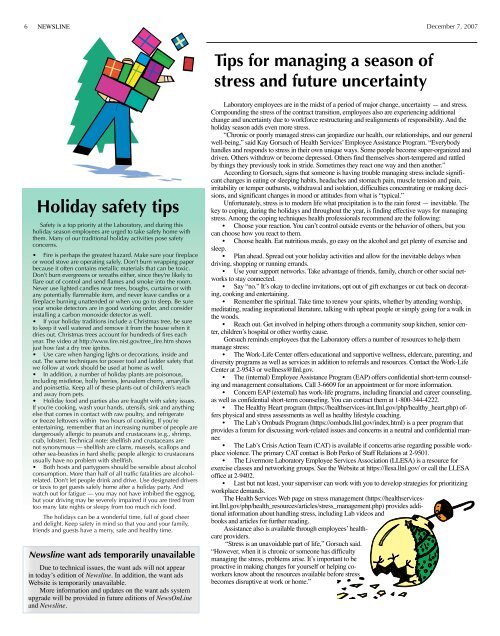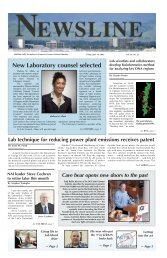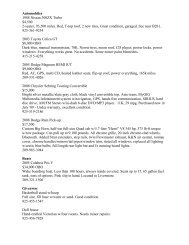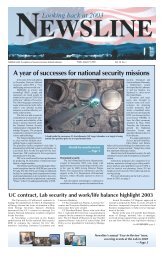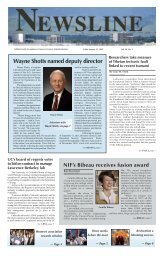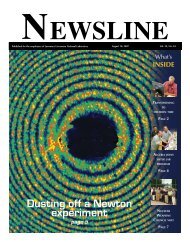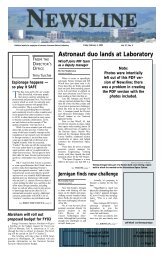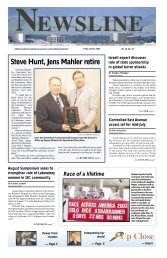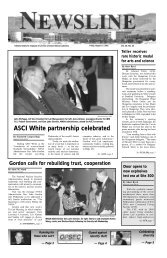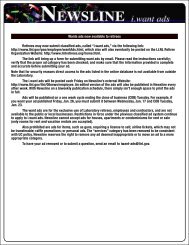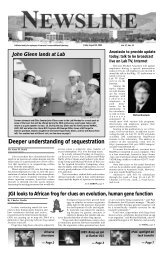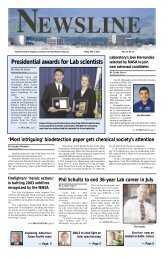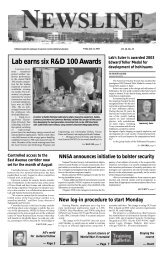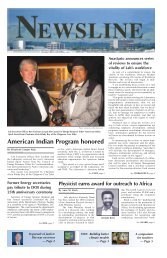NEWSLINE - Lawrence Livermore National Laboratory
NEWSLINE - Lawrence Livermore National Laboratory
NEWSLINE - Lawrence Livermore National Laboratory
Create successful ePaper yourself
Turn your PDF publications into a flip-book with our unique Google optimized e-Paper software.
6 <strong>NEWSLINE</strong><br />
December 7, 2007<br />
Holiday safety tips<br />
Safety is a top priority at the <strong>Laboratory</strong>, and during this<br />
holiday season employees are urged to take safety home with<br />
them. Many of our traditional holiday activities pose safety<br />
concerns.<br />
• Fire is perhaps the greatest hazard. Make sure your fireplace<br />
or wood stove are operating safely. Don’t burn wrapping paper<br />
because it often contains metallic materials that can be toxic.<br />
Don’t burn evergreens or wreaths either, since they’re likely to<br />
flare out of control and send flames and smoke into the room.<br />
never use lighted candles near trees, boughs, curtains or with<br />
any potentially flammable item, and never leave candles or a<br />
fireplace burning unattended or when you go to sleep. Be sure<br />
your smoke detectors are in good working order, and consider<br />
installing a carbon monoxide detector as well.<br />
• If your holiday traditions include a Christmas tree, be sure<br />
to keep it well watered and remove it from the house when it<br />
dries out. Christmas trees account for hundreds of fires each<br />
year. The video at http://www.fire.nist.gov/tree_fire.htm shows<br />
just how fast a dry tree ignites.<br />
• Use care when hanging lights or decorations, inside and<br />
out. The same techniques for power tool and ladder safety that<br />
we follow at work should be used at home as well.<br />
• In addition, a number of holiday plants are poisonous,<br />
including mistletoe, holly berries, Jerusalem cherry, amaryllis<br />
and poinsettia. Keep all of these plants out of children’s reach<br />
and away from pets.<br />
• Holiday food and parties also are fraught with safety issues.<br />
if you’re cooking, wash your hands, utensils, sink and anything<br />
else that comes in contact with raw poultry, and refrigerate<br />
or freeze leftovers within two hours of cooking. If you’re<br />
entertaining, remember that an increasing number of people are<br />
dangerously allergic to peanuts and crustaceans (e.g., shrimp,<br />
crab, lobster). Technical note: shellfish and crustaceans are<br />
not synonymous — shellfish are clams, mussels, scallops and<br />
other sea-beasties in hard shells; people allergic to crustaceans<br />
usually have no problem with shellfish.<br />
• Both hosts and partygoers should be sensible about alcohol<br />
consumption. More than half of all traffic fatalities are alcoholrelated.<br />
Don’t let people drink and drive. Use designated drivers<br />
or taxis to get guests safely home after a holiday party. And<br />
watch out for fatigue — you may not have imbibed the eggnog,<br />
but your driving may be severely impaired if you are tired from<br />
too many late nights or sleepy from too much rich food.<br />
The holidays can be a wonderful time, full of good cheer<br />
and delight. Keep safety in mind so that you and your family,<br />
friends and guests have a merry, safe and healthy time.<br />
Newsline want ads temporarily unavailable<br />
Due to technical issues, the want ads will not appear<br />
in today’s edition of Newsline. In addition, the want ads<br />
Website is temporarily unavailable.<br />
More information and updates on the want ads system<br />
upgrade will be provided in future editions of NewsOnLine<br />
and Newsline.<br />
Tips for managing a season of<br />
stress and future uncertainty<br />
<strong>Laboratory</strong> employees are in the midst of a period of major change, uncertainty — and stress.<br />
Compounding the stress of the contract transition, employees also are experiencing additional<br />
change and uncertainty due to workforce restructuring and realignments of responsibility. And the<br />
holiday season adds even more stress.<br />
“Chronic or poorly managed stress can jeopardize our health, our relationships, and our general<br />
well-being,” said Kay Gorsuch of Health Services’ Employee Assistance Program. “Everybody<br />
handles and responds to stress in their own unique ways. Some people become super-organized and<br />
driven. Others withdraw or become depressed. Others find themselves short-tempered and rattled<br />
by things they previously took in stride. Sometimes they react one way and then another.”<br />
According to Gorsuch, signs that someone is having trouble managing stress include significant<br />
changes in eating or sleeping habits, headaches and stomach pain, muscle tension and pain,<br />
irritability or temper outbursts, withdrawal and isolation, difficulties concentrating or making decisions,<br />
and significant changes in mood or attitudes from what is “typical.”<br />
Unfortunately, stress is to modern life what precipitation is to the rain forest — inevitable. The<br />
key to coping, during the holidays and throughout the year, is finding effective ways for managing<br />
stress. Among the coping techniques health professionals recommend are the following:<br />
• Choose your reaction. You can’t control outside events or the behavior of others, but you<br />
can choose how you react to them.<br />
• Choose health. Eat nutritious meals, go easy on the alcohol and get plenty of exercise and<br />
sleep.<br />
• Plan ahead. Spread out your holiday activities and allow for the inevitable delays when<br />
driving, shopping or running errands.<br />
• Use your support networks. Take advantage of friends, family, church or other social networks<br />
to stay connected.<br />
• Say “no.” It’s okay to decline invitations, opt out of gift exchanges or cut back on decorating,<br />
cooking and entertaining.<br />
• Remember the spiritual. Take time to renew your spirits, whether by attending worship,<br />
meditating, reading inspirational literature, talking with upbeat people or simply going for a walk in<br />
the woods.<br />
• Reach out. Get involved in helping others through a community soup kitchen, senior center,<br />
children’s hospital or other worthy cause.<br />
Gorsuch reminds employees that the <strong>Laboratory</strong> offers a number of resources to help them<br />
manage stress:<br />
• The Work-Life Center offers educational and supportive wellness, eldercare, parenting, and<br />
diversity programs as well as services in addition to referrals and resources. Contact the Work-Life<br />
Center at 2-9543 or wellness@llnl.gov.<br />
• The (internal) Employee Assistance Program (EAP) offers confidential short-term counseling<br />
and management consultations. Call 3-6609 for an appointment or for more information.<br />
• Concern EAP (external) has work-life programs, including financial and career counseling,<br />
as well as confidential short-term counseling. You can contact them at 1-800-344-4222.<br />
• The Healthy Heart program (https://healthservices-int.llnl.gov/php/healthy_heart.php) offers<br />
physical and stress assessments as well as healthy lifestyle coaching.<br />
• The Lab’s Ombuds Program (https://ombuds.llnl.gov/index.html) is a peer program that<br />
provides a forum for discussing work-related issues and concerns in a neutral and confidential manner.<br />
• The Lab’s Crisis Action Team (CAT) is available if concerns arise regarding possible workplace<br />
violence. The primary CAT contact is Bob Perko of Staff Relations at 2-9501.<br />
• The <strong>Livermore</strong> <strong>Laboratory</strong> Employee Services Association (LLESA) is a resource for<br />
exercise classes and networking groups. See the Website at https://llesa.llnl.gov/ or call the LLESA<br />
office at 2-9402.<br />
• Last but not least, your supervisor can work with you to develop strategies for prioritizing<br />
workplace demands.<br />
The Health Services Web page on stress management (https://healthservicesint.llnl.gov/php/health_resources/articles/stress_management.php)<br />
provides additional<br />
information about handling stress, including Lab videos and<br />
books and articles for further reading.<br />
Assistance also is available through employees’ healthcare<br />
providers.<br />
“Stress is an unavoidable part of life,” Gorsuch said.<br />
“However, when it is chronic or someone has difficulty<br />
managing the stress, problems arise. It’s important to be<br />
proactive in making changes for yourself or helping coworkers<br />
know about the resources available before stress<br />
becomes disruptive at work or home.”


